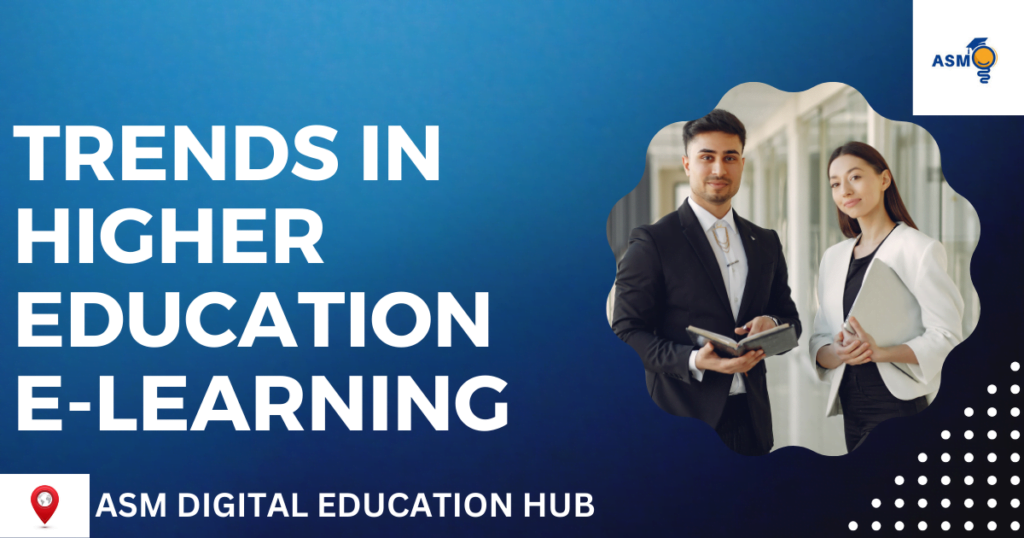1. Future Of Higher Education E-Learning
2. Trends In Higher Education E-Learning
3. Innovations In Higher Education E-Learning
Personalized Learning:
Adaptive learning platforms use data analytics and AI to tailor educational content to individual student needs, pacing, and learning styles.
Personalized learning paths help students focus on areas where they need improvement, enhancing overall learning outcomes.
Future Of Higher Education E-Learning
Artificial Intelligence (AI) and Machine Learning (ML):
AI-powered tools assist in grading, provide personalized feedback, and even predict students’ performance.
Chatbots and virtual assistants offer instant support, answering queries and providing guidance.
Virtual and Augmented Reality (VR/AR):
Immersive technologies enhance the learning experience by providing virtual field trips, simulations, and hands-on experiences.
VR classrooms enable remote students to feel more connected and engaged.
Microlearning:
Bite-sized, easily digestible content caters to shorter attention spans and facilitates on-the-go learning.
Microlearning modules focus on specific skills or concepts, making it easier for students to grasp and retain information.
Gamification:
Gamified elements, such as badges, leaderboards, and rewards, motivate students and make the learning experience more enjoyable.
Game-based learning platforms offer interactive and engaging educational experiences.
Trends In Higher Education E-Learning
Online Collaboration and Social Learning:
Social media-style platforms and collaborative tools facilitate communication and teamwork among students.
Online discussion forums, collaborative projects, and peer-to-peer learning opportunities are integrated into e-learning environments.
Blockchain for Credentials and Verification:
Blockchain technology is being explored for secure storage and verification of academic credentials, ensuring transparency and preventing fraud.
Continuous Learning and Upskilling:
Lifelong learning platforms provide opportunities for professionals to upskill and stay relevant in rapidly changing industries.
Micro-credentials and digital badges serve as recognized proof of specific skills.
Data Analytics for Learning Insights:
Learning analytics help educators track student progress, identify areas of improvement, and optimize course content in real-time.
Accessibility and Inclusivity:
E-learning platforms are focusing on making content more accessible to individuals with diverse learning needs.
Closed captioning, alternative text for images, and other accessibility features are becoming standard.
Innovations In Higher Education E-Learning
Remote Proctoring and Online Assessments:
Secure online assessment tools and remote proctoring solutions allow for the secure conduct of exams in the virtual environment.
Integration of Industry-Relevant Skills:
Curricula are being designed in collaboration with industry partners to ensure that students acquire skills that are directly applicable in the workforce.

New Trends in Higher Education E-Learning
1. AI-Powered Personalized Learning
- Customizes content to individual student needs.
- Enhances learning efficiency with adaptive assessments.
2. Gamification of Education
- Integrates game-like elements such as rewards and challenges.
- Boosts student engagement and motivation.
3. Immersive Learning with VR and AR
- Provides virtual environments for hands-on experiences.
- Ideal for fields like medicine, engineering, and the arts.
4. Micro-Credentials and Short Courses
- Offers targeted skill development for specific industries.
- Flexible and accessible for lifelong learners and professionals.
5. Hybrid Learning Models
- Combines online and offline teaching for maximum flexibility.
- Addresses diverse learning preferences and circumstances.
6. Cloud-Based Collaboration Tools
- Facilitates global connectivity among students and educators.
- Encourages teamwork and shared learning experiences.
These trends are revolutionizing higher education, making learning more accessible, engaging, and aligned with modern technological advancements.
It’s important to stay updated on the latest developments in higher education e-learning as the field is dynamic and continuously evolving. Keep an eye on emerging technologies and how they are being incorporated into educational practices.
E-learning in higher education is undergoing a transformation driven by cutting-edge technologies and innovative teaching methodologies. One of the most prominent trends is the integration of artificial intelligence (AI), which enables personalized learning experiences by tailoring content to individual student needs. Gamification is another significant advancement, making learning more engaging and interactive through game-like elements such as rewards and challenges. Virtual and augmented reality technologies are also gaining traction, providing immersive environments for subjects like medicine, engineering, and the arts. These tools bridge the gap between theoretical knowledge and practical application, enhancing the learning experience.
Moreover, the rise of micro-credentials and short online courses is reshaping how students acquire skills and showcase their expertise. These flexible programs cater to lifelong learners and professionals looking to upskill or reskill in a rapidly evolving job market. Hybrid learning models, which blend online and in-person instruction, are becoming the norm, offering the best of both worlds. Cloud-based learning platforms and collaborative tools are fostering global connectivity, allowing students and educators to interact across geographies. These trends reflect a broader shift towards accessible, inclusive, and technology-driven education in the 21st century.


